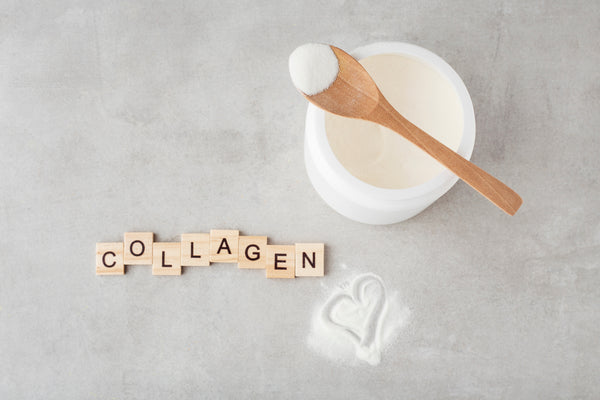Aha! Collagen is an important component of the body. The structural protein is responsible for the elasticity and strength of skin, bones, tendons and cartilage tissue. Laboratory medicine recognizes 3 collagen types I/II/III - in the serious nutritional supplement industry, this classification is irrelevant. We explain why.
Collagen plays a crucial role in our health and beauty. It is the most abundant protein in our body and is an important component of our connective tissue, skin, bones, tendons and ligaments.
The body's own production of collagen occurs through specialized cells called fibroblasts. The fibroblasts synthesize and secrete the various components of collagen, which are then assembled into fibers. These fibers form a framework that gives strength and structure to our skin, bones, tendons and ligaments.
However, as we age, our body's own production of collagen decreases. This complex process is also regulated by various factors, including our genetic predisposition, hormones, environmental factors and diet.
In order to compensate for the body's own loss and support its own production, we can give it to the body as a dietary supplement. Our Collagen Extra Forte is made from hydrolyzed collagen peptide and is particularly rich in amino acids that are important for the formation of bones, cartilage and connective tissue. But which types of collagen does it contain?
An irrelevant classification for dietary supplements
The distinction between collagen types I/II/III is not used in the serious nutritional supplement industry. The reason is that there is no biochemical evidence that this classification is important when taken orally, since our stomach breaks down the molecules into amino acids using gastric acid.
The purpose of taking collagen products orally is that after metabolism, the ideal and relatively optimal amino acids are available to the body in order to produce the body's own collagen and thus generally improve the connective tissue situation.

What happens in our body when we take collagen orally?
When consumed through food or supplements, collagen peptides are digested in the digestive tract. This process involves breaking down the larger collagen protein chains into smaller peptides and ultimately into individual amino acids.
The digestive enzymes in the stomach, such as pepsin, help to break down the collagen protein into smaller peptide chains. Further degradation occurs in the small intestine, where proteolytic enzymes such as trypsin, chymotrypsin and peptidases break these peptides down into individual amino acids.
These amino acids, including glycine, proline, hydroxyproline and others that are abundant in collagen, are then absorbed through the intestinal wall into the bloodstream. Once in the bloodstream, these individual amino acids are transported to different cells in the body where they are used for different purposes.
Thus, collagen peptides are broken down into their constituent amino acids during digestion and are absorbed and transported as amino acids to be used by cells for various physiological functions, including collagen synthesis, tissue repair and other metabolic processes.
What are the 3 types of collagen and where are they used?
The distinction between the three collagen types I/II/III is best made exclusively in the laboratory, for example when reproducing skin and cartilage tissue for injured structures. These reproductions are then implanted via surgical interventions or used for skin transplants.
And if you were to classify the supplement by type...
When collagen is extracted from bovine hide, as is the case with our Collagen Extra Forte, it contains mainly type I collagen, as this is the dominant form in the skin. However, the final product may also contain small amounts of type III collagen, as type III collagen is often found together with type I collagen in the skin.
Type II collagen, which is found primarily in cartilage, would not normally be included in collagen from bovine hide unless the product is specifically made from cartilage tissue. Overall, the composition of collagen in the final product depends on which tissue it is derived from and how it is processed.
Conclusion
As explained above, this distinction is irrelevant when it comes to dietary supplements. Much more important is the correct and reputable manufacturing process, the origin of the collagen and the purity of the product.
Our Collagen Extra Forte is a highly pure collagen product without additives. It comes from controlled European agriculture, meets the highest quality standards and is tested for the absence of pro-hormones (anti-doping) for safety reasons.
A question from the BTC community
We listen. This article was created because of a question from the BTC community. Do you have a question about nutrition and our products or inputs? Then write to us via the usual channels such as live chat, WhatsApp, email or on the product page under "Reviews and Questions" - we are happy to help you!


